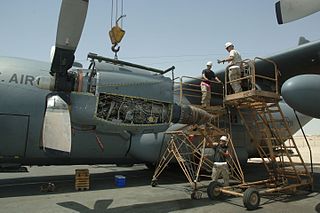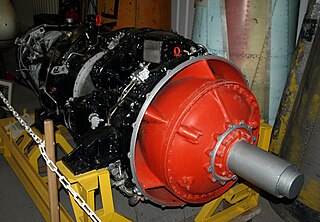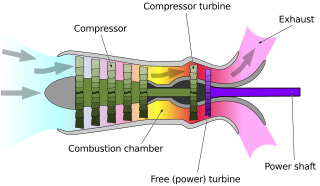
Safran Helicopter Engines, previously known as Turbomeca, is a French manufacturer of low- and medium-power gas turbine turboshaft engines for helicopters. The company also produces gas turbine engines for aircraft and missiles, as well as turbines for land, industrial and marine applications.

The Rolls-Royce T406 is a turboshaft engine that powers the Bell Boeing V-22 Osprey tiltrotor. The engine delivers 6,000 shp (4,470 kW).

Rolls-Royce Turbomeca Limited (RRTM) is a joint venture between British aero-engine manufacturer Rolls-Royce plc (UK) and French helicopter engine specialist Safran Helicopter Engines. It manufactured aero-engines and provided associated support services to end users.

The LHTEC T800 is a turboshaft engine for rotary wing applications. It is produced by the LHTEC, a joint venture between Rolls-Royce and Honeywell. The commercial and export version is the CTS800. The engine was primarily developed for the United States Army's cancelled RAH-66 Comanche armed reconnaissance helicopter, but has found use in other applications.
GE Aviation, a subsidiary of General Electric, is headquartered in Evendale, Ohio, outside Cincinnati. GE Aviation is among the top aircraft engine suppliers, and offers engines for the majority of commercial aircraft. GE Aviation is part of the General Electric conglomerate, which is one of the world's largest corporations. The division operated under the name of General Electric Aircraft Engines (GEAE) until September 2005. GE Aviation's main competitors in the engine market are Pratt & Whitney and Rolls-Royce.

The Allison T56 is an American single-shaft, modular design military turboprop with a 14-stage axial flow compressor driven by a four-stage turbine. It was originally developed by the Allison Engine Company for the Lockheed C-130 Hercules transport entering production in 1954. It has been a Rolls-Royce product since 1995 when Allison was acquired by Rolls-Royce. The commercial version is designated 501-D. Over 18,000 engines have been produced since 1954, logging over 200 million flying hours.

The Honeywell TPE331 is a turboprop engine. It was originally designed in the 1950s by Garrett AiResearch, and produced since 1999 by Honeywell Aerospace. The engine's power output ranges from 575 to 1,650 shaft horsepower.

The Rolls-Royce Gem is a turboshaft engine developed specifically for the Westland Lynx helicopter in the 1970s. The design started off at de Havilland and was passed to Bristol Siddeley as the BS.360. When Rolls-Royce bought out the latter in 1966, it became the RS.360.

The Allison Model 250, now known as the Rolls-Royce M250, is a highly successful turboshaft engine family, originally developed by the Allison Engine Company in the early 1960s. The Model 250 has been produced by Rolls-Royce since it acquired Allison in 1995.

The Napier Eland was a British turboshaft or turboprop gas-turbine engine built by Napier & Son in the early 1950s. Production of the Eland ceased in 1961 when the Napier company was taken over by Rolls-Royce.

The Honeywell AGT1500 is a gas turbine engine. It is the main powerplant of the M1 Abrams series of tanks. The engine was originally designed and produced by the Lycoming Turbine Engine Division in the Stratford Army Engine Plant. In 1995, production was moved to the Anniston Army Depot in Anniston, Alabama, after the Stratford Army Engine Plant was shut down.

The General Electric T64 is a free-turbine turboshaft engine that was originally developed for use on helicopters, but which was later used on fixed-wing aircraft as well. General Electric introduced the engine in 1964. The original engine design included technical innovations such as corrosion resistant and high-temperature coatings. The engine features a high overall pressure ratio, yielding a low specific fuel consumption for its time. Although the compressor is all-axial, like the earlier General Electric T58, the power turbine shaft is coaxial with the HP shaft and delivers power to the front of the engine, not rearwards. Fourteen compressor stages are required to deliver the required overall pressure ratio. Compressor handling is facilitated by 4 rows of variable stators. Unlike the T58, the power turbine has 2 stages.

The Safran Ardiden is a 1,400–2,000 hp (1,000–1,500 kW) turboshaft designed and produced by Safran Helicopter Engines for 5–8 t (11,000–18,000 lb) single and twin-engine helicopters. Launched in 2003 as a more powerful TM 333, it first ran in 2005 and was introduced in 2007. The Ardiden 1 Shakti powers the Indian HAL Dhruv, Light Combat Helicopter and Light Utility Helicopter while the more powerful Ardiden 3 powers the Avicopter AC352 and Kamov Ka-62.
Honeywell Aerospace is a manufacturer of aircraft engines and avionics, as well as a producer of auxiliary power units (APUs) and other aviation products. Headquartered in Phoenix, Arizona, it is a division of the Honeywell International conglomerate. It generates approximately $10 billion in annual revenue from a 50/50 mix of commercial and defense contracts.

The Honeywell T55 is a turboshaft engine used on American helicopters and fixed-wing aircraft since the 1950s, and in unlimited hydroplanes since the 1980s. Today, there have been more than 6,000 of these engines built. It is produced by Honeywell Aerospace, a division of Honeywell based in Phoenix, Arizona, and was originally designed by the Turbine Engine Division of Lycoming Engines in Stratford, Connecticut, as a scaled-up version of the smaller Lycoming T53. Both engines are now produced by Honeywell Aerospace, and the T55 serves as the engine on several major applications including the CH-47-Chinook, the Bell 309, and the Piper PA-48 Enforcer. The T55 also serves as the core of the Lycoming ALF 502 turbofan. Since the T55 was first developed, progressive increases in airflow, overall pressure ratio, and turbine inlet temperature have more than tripled the power output of the engine.
The Garrett F109 was a small turbofan engine developed for the Fairchild T-46 by Garrett AiResearch. With the United States Air Force's cancellation of the T-46 program in 1986, further development of the engine ceased, and with it the civil TFE109 version.
Vericor Power Systems is a manufacturer of aeroderivative marine and industrial gas turbines based in Alpharetta, Georgia, United States. Vericor is a wholly owned subsidiary of German-based MTU Aero Engines.

The Continental Tiara series are a family of air-cooled, horizontally opposed aircraft engines. Designed and built by Continental Motors/TCM, the Tiara series were commercially unsuccessful, costing the company millions of dollars.
The Avco/Pratt & Whitney T800 was a turboshaft engine for rotary wing applications, and was produced by Avco/Pratt & Whitney (APW), a joint venture between Avco Lycoming and Pratt & Whitney. The engine was developed for the United States Army's LHX armed reconnaissance helicopter competition to develop the Boeing-Sikorsky RAH-66 Comanche, but lost to the competing LHTEC T800 in 1988.

A free-turbine turboshaft is a form of turboshaft or turboprop gas turbine engine where the power is extracted from the exhaust stream of a gas turbine by an independent turbine, downstream of the gas turbine. The power turbine is not mechanically connected to the turbines that drive the compressors, hence the term "free", referring to the independence of the power output shaft. This is opposed to the power being extracted from the turbine/compressor shaft via a gearbox.















